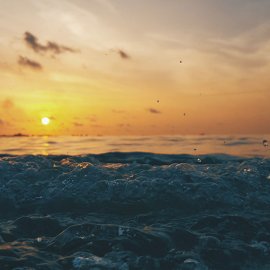The Sound of Water
-
English
-
ListenPause
[intro music] Welcome to World Ocean Radio… I’m Peter Neill, Director of the World Ocean Observatory. How many ways do we hear the sound of water? Just to think about it demands a total immersion in sensory memory and anecdotal recall. What was that sound? When was it? Where was it? How do these questions pertain to its articulation in words, a medium fractured and evocative, but ultimately limited in comparison to the infinite euphony of water? Think of water as many sounds in one sound: myriad compositions, with ripples and waves as notation of melodies and embellishments. Every performance is unique; the players invisible; the conductor, wind and weather; the orchestra, a system of conveyance that responds to the direction of planetary turning and gravitational force. Think of the earth as a vast concert hall for the appreciation for how we, as individuals and cultures, explore the extent of water, Nature’s most essential element, and interpret its meaning, overtly, or covertly through our senses to our minds. But who is the composer? Is there a creator? Every culture has its story of origin, often connected to manifestations of water. The great flood. The drowning. The miraculous survival. The baptism. The burial at sea. We want to explain, attribute the making of the ephemeral and fluid to a hand that often looks like ours, as if we are both an expression of the divine and its maker. Water lies at the core of mystery, the miraculous, the appearances that dissolve into the inexplicable and unknowable. There is no definitive answer to who or how, only the certainty of movement. Think of the sound of water on water: rain on the pond, incoming waves on the receding. This is the percussion, the underlying rhythm of constant motion, the fluid beat of time, a nd change. This is the code we seek to break when we sit by the stream or walk alongshore, looking for answers, reasons, place, and value. That search is universal, not exclusive to any one of us apart from all the others. What would it be if we all found what we look for when we go to the ocean in search for life in a single drop? That would be value beyond value: a crest of understanding, of spiritual meaning and psychological solace, that might unite the world just as, together, the whales swim long distances north to south, the salmon return home to spawn, the turtle lays her eggs for the next generation to risk its life in the sea. If that is so, why would we do anything to put that conjoining medium at risk by consuming it to extinction, or by poisoning it beyond utility, or by failing to conserve and sustain it as key to our survival? As with so many things that shape the human quandary, it makes no sense. What would it mean if there was no water? What if all the rain is acid, the wells are exhausted and the aquifers finally run dry? What if we pollute and consume without limit? What if changing climate and increasing temperature do create conditions that so erode our industrial, agricultural, sanitation, and urban systems that society is compromised toward chaos? Think about that future as drought, and drought as silence, and silence as the expression of emptiness inside. Who are we then, without vitality, movement, aspiration, security, continuity, hope of a future? The sound of water is the music of life. Without it we are hollow and dry, deaf and dumb, silent and deadly, useless and unworthy. We need it to birth and grow. We need it to nurture body and soul. We need it to sustain our families and friends, our communities and nation states, our sense of possibility and optimism for a world somehow better, less fraught, more equitable and just through the magical sound of water. Go down to where that water flows: as you drink, remember; as you listen, resolve, that such beauty must be shared, and that you are now creator, conductor, and virtuoso performer in the symphonic masterpiece called water. We will discuss these issues, and more, in future editions of World Ocean Radio. [outro music]
How many ways do we hear the sound of water? In this episode of World Ocean Radio we explore water, the most essential element on earth, and the ways that we need it to thrive and survive, to nourish our bodies and our souls, and to sustain our families and our communities.
Do you prefer the written word? Head on over to Medium.com/@TheW2O.
About World Ocean Radio
World Ocean Radio is a weekly series of five-minute audio essays available for syndicated use at no cost by college and community radio stations worldwide. Peter Neill, Director of the World Ocean Observatory and host of World Ocean Radio, provides coverage of a broad spectrum of ocean issues from science and education to advocacy and exemplary projects.
Image Credit
Kalhuthukala Magu
Malé, Maldives
- Login to post comments



